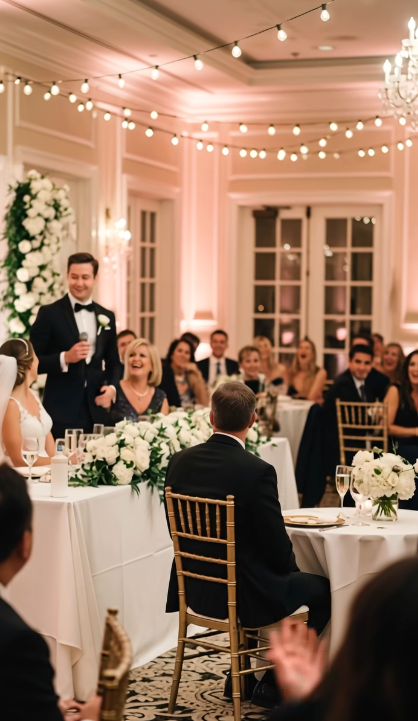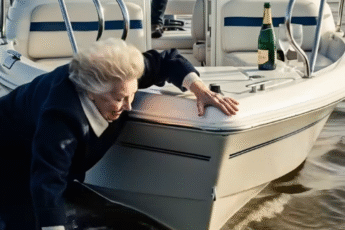I wasn’t born with money. I earned it the hard, cold, thankless way, forged in the fires of late nights and early mornings when no one was betting on me. My first marriage crumbled into dust before I saw my first six-figure check, and by the time I met Miranda, I was a man more accustomed to the echo of my own footsteps than the warmth of a partnership.
Miranda came with a teenage daughter, Belle. She was fifteen going on forty, armed with a sharp tongue, a sharper wardrobe, and eyes that measured your net worth before she decided if a smile was worth her time. Still, I saw a chance to build something steady. Miranda needed stability, and Belle, though she’d never admit it, needed structure. I didn’t ask for much in return back then—just the quiet hope that showing up, day after day, might eventually earn me a seat at their table.
Being a stepfather is a role with no map. I never tried to replace her biological father, a man who drifted in and out of her life with the performative charm of a movie star. He’d appear for birthdays with grand gestures and checks he could barely cash, leaving a trail of broken promises that Belle, blinded by adoration, never seemed to see. I was the man in the background, the one paying tuition, fixing the brakes on her first car, and reviewing college applications at midnight. I never expected her to call me dad. I just hoped, foolishly, that she would one day recognize the difference between fleeting attention and unwavering commitment.
That recognition never came. Instead, a pattern formed. I wasn’t her father, but I was her fund. Engagement rings, moving costs, designer suits for interviews—if it was out of her reach, I became the solution. The “thank yous” were rare and felt like afterthoughts, but I told myself it didn’t matter. I was doing it for family. For the life I had chosen.
Over the years, I brought Belle into my company. She was smart, driven, and had my instincts for finance. I was proud of her. I thought our working relationship had forged a new kind of respect between us, something real we had built together. But outside the office, the wall remained. I was always “my mom’s husband,” a footnote in her life story. I told myself it was fine. That love didn’t always look the way you imagined it.
When she got engaged to Jamal, a polished marketing manager with an easy smile, the wedding planning began instantly. It was assumed, without a single conversation, that I would handle the costs. Not a gift, but an obligation. I paid for the dress, the venue, the catering, the open bar, the live band, and the horse-drawn carriage. I signed every check and wired every payment without a single word of complaint. Because deep down, in the part of me that refused to give up hope, I believed that on her wedding day, she would finally see me. That she would stand before everyone and say my name, and in that one moment, I would finally, truly, be family.
Weddings bring out the theater in people. The smiles are wider, the laughter louder. As I stood in the back of the bridal suite that morning, watching Belle float in a cloud of silk and bridesmaids, I felt like a stagehand in someone else’s production. Miranda, my wife, directed the chaos like a general, her eyes sweeping past me as if I were part of the furniture. I stayed quiet. It had become my way. Present but invisible. And I kept telling myself, Tonight, it will be different.
The reception hall was a testament to my checkbook, a symphony of lights, flowers, and laughter. I sat with Miranda, watching Belle and Jamal dance, my heart holding on to that last sliver of hope. The lights dimmed for the speeches. Belle took the microphone, her voice light and polished. She thanked her mother for being her rock. She thanked her biological father for making her feel like his little girl. She thanked her in-laws, her maid of honor, even a friend who flew in from Chicago.
Not a word for me. Not even a glance.
I felt Miranda stiffen beside me, but she said nothing. She just kept smiling, clapping along as if nothing was wrong. I could have swallowed it. I had trained myself for years to swallow this exact brand of quiet disappointment.
But then Jamal, her new husband, took the mic. He slung his arm around Belle’s waist, grinning at the crowd. “And let’s not forget,” he boomed, his voice slick with charm, “my wife’s stepdad fully funded this entire wedding!” He paused for effect. “But don’t worry, he doesn’t need a shout-out. He’s just our family ATM!”
There was a beat of stunned silence. And then, it erupted. Laughter. Not polite chuckles, but loud, rolling, genuine laughter. The groomsmen howled. The bridesmaids giggled. And Miranda—my wife—threw her head back and laughed. Belle laughed hardest of all, her hand on her chest as if it was the funniest joke she had ever heard.
ATM. Just an ATM.
That’s what I was. Not a mentor, not a provider, not the steady hand that had guided her life. Just a machine that dispensed cash. In that moment, something inside me didn’t just break; it turned to ice.
I didn’t make a scene. I stood up quietly, walked through the side hallway, and left my stepdaughter’s wedding. The most painful part was not the joke itself. It was the chilling realization that in a room of two hundred people, not a single person, not even my wife, noticed I was gone.
I drove home in a silence so profound it rang in my ears, the sound of their laughter a permanent echo. I don’t know what snapped, but by the time I pulled into my driveway, I wasn’t angry or sad. I was done. Emotionally, spiritually, completely done.
I walked into the house with the clarity of a man who was finally choosing himself. Miranda’s belongings were still packed from her hotel stay for the wedding. I took her bags, her laptop, her shoes, her coats, and placed them neatly on the front porch. I wanted no chaos, no cruelty. Just closure.
I sent her a single text: “Your things are outside. Don’t come back.”
Then I turned off my phone, locked the door, and for the first time in over a decade, I sat in the quiet of my own home and felt the weight of a boundary finally being drawn.
She showed up the next morning, her hair still pinned from the wedding. She stared at the bags on the porch, her face a mask of disbelief. She knocked. I didn’t answer. She knocked again, harder this time.
Finally, I opened the door just enough for her to see my face. “Are you serious?” she demanded. “You’re throwing me out over a joke?”
I let her words hang in the air. “You laughed,” I said, my voice unnervingly calm. “With them. At me.”
“Oh, come on!” she scoffed. “It was a wedding! Jamal was just trying to be funny.”
“What he said wasn’t funny,” I replied. “It was disrespectful. What you did was worse.”
“I didn’t say anything!”
“Exactly,” I said. “You didn’t stop him. You didn’t correct him. You just laughed, confirming to a room full of people that I am nothing more than a wallet to this family.”
“Where am I supposed to go?” she asked, her voice finally losing its edge.
“That’s not my problem anymore,” I said. “You chose where you stood last night.”
She left without another word, loading her bags into her car with a quiet, defeated fury. As she drove away, I didn’t feel triumph. I felt a heavy, profound stillness. The endless cycle of wondering if I was being too sensitive was over. I wasn’t. I was simply done.
The next day, I went to the office early. My clarity was a cold, sharp instrument. On my computer, I pulled up the organizational chart. Belle, Assistant Director of Finance. Jamal, Marketing Manager. Two salaries I paid. Two lives I had propped up. Two people who had laughed at my public humiliation.
I called Human Resources and explained the situation, not in emotional terms, but in the language of corporate policy: a breach of professional conduct, public disparagement of executive leadership. I asked them to prepare the termination letters. I would handle the conversations myself.
By noon, they were sitting in my office, looking confused.
“I’m terminating your employment,” I said, looking from one to the other. “Effective immediately.”
“You can’t be serious,” Belle said, her voice rising.
“Because of a joke?” Jamal added, forcing a laugh.
“No,” I replied calmly. “Because of a moment of truth. It showed me exactly how little you respect me, and respect is non-negotiable.”
“This is my career!” Belle snapped. “You’re ruining my future over your ego!”
“No,” I said, standing. “You ruined it the moment you laughed. I will not employ anyone who mocks the hand that feeds them. Not in my home. Not in my business. Not ever again.”
They pleaded. They argued. They accused me of overreacting. But nothing they said could erase the sound of their laughter. It wasn’t about the wedding anymore. It was about years of quiet giving met with escalating disrespect. I had been the bigger person for a decade. All it had taught them was how to overlook me more efficiently.
After they left, a strange quiet settled over the office. One of my senior partners, Andre, who had been with me from the beginning, came into my office and closed the door.
“Took guts,” he said simply.
I looked up, surprised.
“Most people would have let it slide. Pretended it didn’t sting,” he continued. “You pulled the cord. That’s leadership. That’s knowing your worth.” He told me he’d seen a clip of the wedding speech. “That wasn’t a joke,” he said, his eyes serious. “That was a declaration that you were disposable.”
A week later, a handwritten letter from Belle arrived. Three pages of self-pity and blame, wrapped in a half-hearted apology that started with, “I’m sorry if you felt disrespected.” She wrote about how my actions had embarrassed her, how I had jeopardized their future. Not once did she say the simple words: I’m sorry I hurt you.
I folded the letter and put it in a drawer. I didn’t respond. Some apologies don’t deserve an answer. Some doors, once closed, should stay that way—not out of spite, but out of a long-starved sense of self-respect. The silence in my house, once a source of loneliness, started to feel like a sanctuary. I had traded their conditional presence for my own unconditional peace. And for the first time in a very long time, it felt like a fair exchange.





